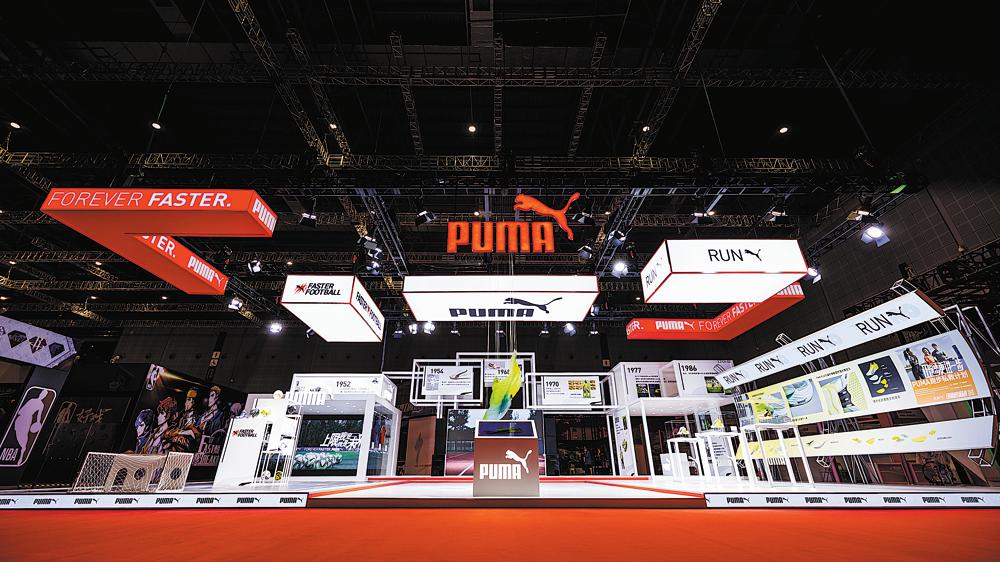Puma debuts at CIIE demonstrating commitment to China

Puma's booth impresses at the fourth China International Import Expo held from Nov 5 to 10 in Shanghai. [Photo provided to China Daily]
German sportswear brand Puma made its debut at the recent fourth China International Import Expo that concluded on Wednesday, showcasing its development history, latest products and its commitment to Chinese consumers and the China market.
"This is our first participation in this exhibition, and we are so happy to participate for the first time," said Philippe Bocquillon, general manager of Puma Greater China.
"You can see in terms of the commitment that we display here at the booth, the important aspects of Puma's brand.
"Puma is a large, performance brand with a legacy of innovation. So you have the past, you have the present, and you have your future in terms of everything and performance," Bocquillon said.
At this year's CIIE, Puma set up an exhibition booth of more than 250 square meters, showcasing the brand's history, a series of football shoes worn by famous players such as Pele, Johan Cruyff and Diego Maradona, as well as revolutionary running shoes.
During the event, the company made the world debut of its new running shoes-Fast-R Nitro Elite-which have been developed using new technologies and will be marketed in 2022.
"China is changing very fast and 'forever faster' is our motto, so we have all the tools to be successful in the market," Bocquillon said.
Entering the Chinese market in 1999, Puma set up its first branch in China in 2003, accelerating its business expansion in the country. Puma has opened more than 2,200 stores in nearly 600 cities around China and has more than 1,400 employees in the country. Puma has established long-term partnerships with local companies including e-commerce giants Alibaba and JD.
Dedicated to implementing its localization strategy of "in China for China", Puma has developed tailor-made products and plans in response to Chinese consumers' needs. It has designed online and offline sports activities such as the Puma Running Online Coaching Program and the Hiphop Yoga Studio to create a consumer community and to build sports engagement. In addition, it offers private one-to-one training courses dedicated to running. Well known for making outstanding football boots, Puma has also developed football kits for Chinese consumers.
The company launched the first generation of its customized multiground-also known as MG-outsole on all series of football shoes. Considering the uniqueness of the Chinese market, which features a wide variety of different-conditioned artificial turf, the MG outsole was designed accordingly with customized shape and spikes. The MG outsole ensures enhanced traction on both hard ground and artificial turf surfaces. In August, Puma released its MG 2.0 upgrade for the shoe's weight and spike size after a year of further research in the country.
"The Chinese market is vibrant and sees fast growth. The national fitness campaign included in the 14th Five-Year Plan (2021-25) means great opportunities for us," said Liang Puxiang, marketing director at Puma Greater China.
"From design to production and business channels to store expansion, we hope to promptly respond to the market and capitalize on opportunities," Liang said.
Adhering to its brand philosophy of Forever Faster, Puma is dedicated to its values of courage, confidence and strength, and hopes it can contribute to the sports industry. It has constantly cooperated with local companies to deliver its brand spirit to Chinese consumers and bring them better products and experiences. In June, Puma joined hands with Chinese streetwear brand Equalizer to launch a co-branded football shoe dubbed Future Z, as part of its effort to encourage more amateur football players.
As the sports industry has developed, the German brand has witnessed tremendous changes in the marketplace.
Years ago, first- and second-tier cities used to be Puma's major markets and the company has focused more on offline businesses, Liang said.
But now Puma not only operates on e-commerce platforms but also meets increasing demands from the third-and fourth-tier cities, he added.
"The increasing need is not just about product quantity but a more rigid requirement in specializing in sports as people put more attention on fitness. The consumption of sports products has become more comprehensive," Liang said.
Living up to sustainable development, Puma has also committed to green production and environmental protection. The company has pledged to hit 10 targets including increasing the usage of sustainable raw materials and reducing ocean-bound plastic waste in its production by 2025. So far, six of the targets have been accomplished, according to the company.
Puma said it has adopted a 100 percent usage of eco-friendly raw materials in its clothes and accessory production. "We have put a large part of production in China and environmental protection is the goal that we keep chasing," Liang said.


